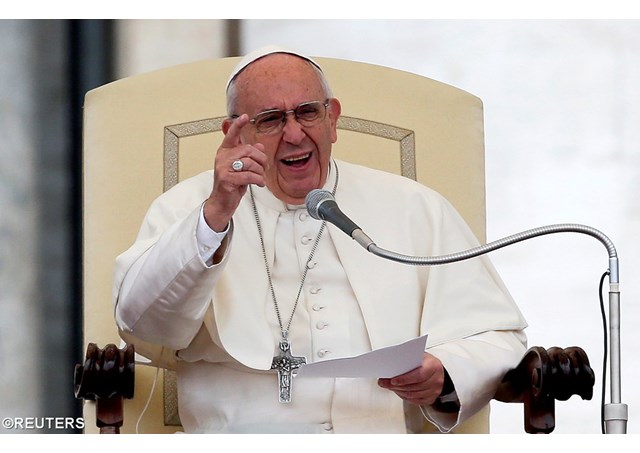
Pope Francis gives interview ahead of trip to Sweden

(Vatican Radio) Pope Francis has called making war in the name of religion “satanic” and a "blasphemy.”
His words came in an interview with the Jesuit Catholic journal La Civiltà Cattolica ahead of his ecumenical Apostolic Trip to Sweden. The interview was conducted by Father Ulf Jonsson S.J., the director of the Swedish cultural journal of the Jesuits, Signum.
Pope Francis mentioned the recent interreligious meeting for peace in Assisi, which he called “very important.”
“All of us talked of peace and we asked for peace,” – the Pope said – “ We together said strong words for peace, what the religions truly want.”
When asked about the suffering of the Christians in the Middle East, Pope Francis called the region “a land of martyrs.”
“I believe that the Lord does not leave his people on their own,” – the Holy Father said – “He will not abandon them. When we read of the hard trials of the people of Israel in the Bible or remember the trials of the martyrs, we see how the Lord always comes to the aid of his people.”
The purpose of the trip to Sweden is to mark the 500th anniversary of the beginning of the Protestant Reformation, and much of the discussion in the interview covered ecumenical affairs.
Speaking about the mutual enrichment possible between Christian communities, the Pope was asked what Catholics could learn from Lutherans.
“Two words come to my mind: ‘reform’ and ‘Scripture’,” - Pope Francis said – “I will try to explain. The first is the word 'reform'. At the beginning, Luther’s was a gesture of reform in a difficult time for the Church. Luther wanted to remedy a complex situation. Then this gesture —also because of the political situations, we think also of the cuius regio eius religio (whose realm , his religion) —became a ‘state’ of separation, and not a process of reform of the whole Church, which is fundamental, because the Church is semper reformanda (always reforming).”
“The second word is ‘Scripture’, the Word of God,” – the Pope continued – “Luther took a great step by putting the Word of God into the hands of the people. Reform and Scripture are two things that we can deepen by looking at the Lutheran tradition. The General Congregations before the Conclave comes to mind and how the request for a reform was alive in our discussions.”
The Holy Father was later asked about how the Ecumenical movement can move forward. He responded by saying “theological dialogue must continue,” and pointing to the Joint Declaration on Justification as an important point, but added “it will not be easy to go forward because of the different ways of understanding some theological questions.”
“Personally, I believe that enthusiasm must shift towards common prayer and the works of mercy -- work done together to help the sick, the poor, and the imprisoned,” – Pope Francis said – “To do something together is a high and effective form of dialogue. I also think about education. It is important to work together and not in a sectarian way. There is a policy we should have clear in every case: to proselytize in the ecclesial field is a sin."
The full text of the interview can be found on the website of La Civiltà Cattolica here.
| All the contents on this site are copyrighted ©. |


